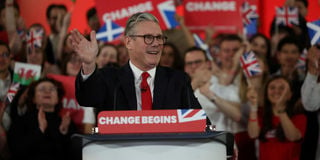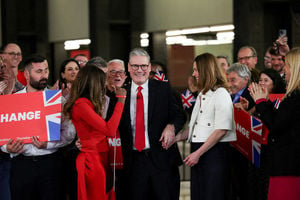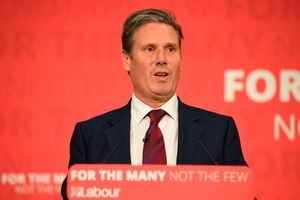
Keir Starmer, leader of Britain's Labour party, reacts as he speaks at a reception to celebrate his win in the election, at Tate Modern, in London, Britain, July 5, 2024.
New British Prime Minister Keir Starmer has come into office on a very seismic victory of his Labour Party, which assures him of a strong majority in Parliament. It could also assure him of his promised path on local and foreign policy.
It could also mean that for the first time in 14 years, the relations between the United Kingdom and allies such as Kenya could change as most things in London have run under the Conservative Party in spite of itself changing Prime Ministers often.
First, the events in Britain seem to be part of the global wind of change mainly fueled by the economic challenges of debt burden and high taxes. The consequences have included civilian protests, increased coup proclivity, and the election of far-right politicians and popular political parties.
Kenya is just emerging from a deadly Gen-Z protest and Bolivia survived a coup attempt caused by an acute shortage of gas compounding the rising cost of living. Around the world, there is also the emergence of power of far-right political parties as in France and Argentina.
Even in the USA, the economy has become a crucial single-most election issue ramping up the possibility of Donald Trump’s comeback.
Economic dilemma
Most African states such as Kenya are in a serious economic dilemma: to stop debt payments and therefore close the much-needed borrowing window, or service the debts and compromise serving their citizens. Additionally, without borrowing, African states have tough and narrow choices: to raise taxes or in desperation print money. But, if they raise taxes they face the risks of public unrest, and printing money directly causes inflation again exacerbating economic crisis and mass protests.
Back to the UK, its economy has stagnated for decades including under the leadership of the Conservative party. The Conservatives took power in 2010 on the platform of addressing the debt crisis, but years of austerity measures yielded little as public debt bulged. They also continued to post the opposite of their pledge for low taxes.
The focal concerns for voters in the snap election included the economy, cost of living, immigration management, rising taxes and diminishing public service. The Conservative Party governments scored very low on these aspects. The outcome is that former Prime Minister Rishi Sunak, whose father was born in Kenya, becomes the last in the continuous succession of the three Conservative prime ministers Britain has had since the last general election in 2019.
Eventually, upon their emphatic electoral loss, the Conservatives exited, leaving behind a debt burden and taxes considered to be the highest in the UK’s 70 years. The public service appears to be in disarray.
The immigration quandary remains complex and unresolved, even though it drove Britons to exit the EU as a stopgap measure against illegal immigration. Outgoing PM Rishi Sunak’s policy strategy to send asylum seekers to Rwanda hit headwinds including court challenges. Labour Party promised to cancel it, especially since the new Premier is a renowned human rights activist.
Though the UK’s global geopolitical weight has reduced, it continues to project itself internationally based on what former British PM Winston Churchill called the three interlocking circles of Britain’s foreign policy: British Commonwealth and Empire, the English-speaking world and united Europe. Additionally, its position in the UNSC and its transatlantic relations with the USA and NATO have sustained the UK’s global relevance.
G7 ranking
Yet, in terms of investment rates, the UK remains at the bottom of the G7 ranking. In 2024, the UK is 6th globally in terms of GDP or economic prowess having been by-passed by India.
For Nairobi, the Kenya-UK diplomatic ties are now on a review table. The diplomatic chemistry that was evident between two sides including hosting joint summits, will perhaps require re-adjustment with the older PM Starmer. President William Ruto will perhaps require more of the diplomatic charm of his foreign cabinet secretary, Musalia Mudavadi who is a peer of the new UK PM Starmer.
Most of the recent trade were signed under the Conservatives but this may not change as the UK in general has favoured trade with Kenya. Overall, Kenya and the UK enjoy long-standing historical ties with close cooperation in key sectors of education, trade and investment
The UK is the largest European foreign investor in Kenya. Currently, there are about 100 British investment companies based in Kenya. The UK is Kenya’s second most important export destination. Kenya mainly exports tea, coffee and horticultural products.
But, the new Labour administration has declared a foreign policy paradigm that is in stark contrast to the neoconservatives. In a recent interview, David Lammy, the newly appointed Foreign Secretary, indicated that the UK under Labour will pursue a foreign policy of “progressive realism,” given the world is more volatile. Progressive realism is a foreign policy approach popularised by American author Robert Wright to denote the intersection between international security and economic interdependence to influence a state’s national interests.
Starmer himself sees it as “taking the world as it is, not as we wish it to be.” He thinks the UK will seek not accumulation of power globally but the attainment of progressive goals such as rule of law, SDGs and inclusion. “It is the pursuit of ideals, without delusions about what's achievable,” he told the Grand Continent journal, in an interview recently.
Stronger international institutions
So, this is a foreign policy that supports stronger international institutions, free trade, and national interests. This means states go beyond hard and soft power to adopt a hybrid approach called smart power. The Labour administration will be seeking to balance the UK’s trade and economic interests with security imperatives. We shall therefore be seeing an advanced role of the UK in international security in addition to its trade and economic emphasis. Already, Labour has promised to increase defence spending to 2.5 per cent of GDP.
Here, Kenya as a rising player in regional global security (also as a Major Non-NATO Ally of the US) will be of interest to the UK’s expected focus on security for its economic national interests. Kenya has called for reforms in bodies like the United Nations and the general financing architecture now dominated by the International Monetary Fund and the World Bank.
We expect to see an enhanced role of the UK in peace and security crises in Africa. Indeed, David Lammy, who was the UK Labour Party’s Shadow Foreign Secretary has been appointed as the country’s bearer of foreign policy. The new Foreign Secretary is of black origin though a British-born citizen, with Guyanese parentage. He is a champion of racial equality and is thus expected to highlight black-race and African challenges and aspirations in the UK, Europe and globally.
Already, the Labour administration has stated that it is committed to recognising a Palestinian state and will be pushing for an immediate ceasefire in the war between Israel and Hamas. They have stressed continued support for Ukraine, terming Russian President Vladimir Putin as “the aggressor in Ukraine.” This appears to align with Kenya’s position as declared at the recent Ukraine Peace Summit in Switzerland.
Foreign policy
Actually, the West, including the UK, see Kenya as pursuing an identical foreign policy with like-minded Western powers and President Ruto has come to be considered as an African thought leader essential for Western alliances. This will most likely not change under the Labour leadership in the UK.
However, the recent protests in Kenya have startled Ruto’s government to the reality that it is risky to be perceived as Western-leaning in a context of growing revulsion among African youths against Western dominance and neocolonialism. All over the world, and particularly in Africa, the backlash of protests and radical political changes have targeted Western liberal ideologies, capitalism and Western-type of democracy.
Nonetheless, Kenya and the UK's long-drawn diplomatic history has entrenched people-to-people relations where currently there are approximately 250,000 British nationals who are permanent residents in Kenya, and over 200,000 Kenyans living in the United Kingdom.
Yet still, the Labour leadership approach to Kenya and Africa cannot at the moment be conclusively fathomed. Given the ongoing vicious geopolitical re-alignments in a new Cold War, the UK seems to be embracing a foreign policy paradigm that is pragmatic in prioritising the country’s national interests.
Nasong’o Muliro Wilfred is a Foreign Policy and Security Specialist and Experienced Lecturer in Kenyan Universities.







